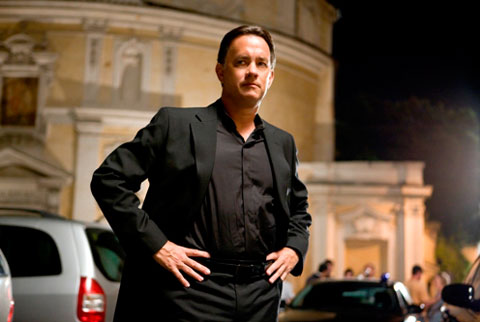Angels & Demons: Now, in the service of the Catholic Church
By Hiram Lee
18 June 2009
Directed by Ron Howard, screenplay by Akiva Goldsman and David Koepp, based on the novel by Dan Brown
 Angels & Demons
Angels & DemonsAngels & Demons is the sequel to the 2006 blockbuster The Da Vinci Code. It reunites director Ron Howard and actor Tom Hanks for their fourth film together and also marks the first time Howard, the former child star, has made a sequel to any of his own films.
When The Da Vinci Code was released three years ago, it generated a certain amount of controversy and was protested by right-wing religious groups such as the Catholic League. Angels & Demons has found a more muted response, in part due to a much friendlier attitude toward the Catholic Church than the one found in the earlier work.
As Angels & Demons opens, the Pope has just died in Rome and the College of Cardinals is preparing to elect a successor. Four cardinals who are favorites to win the vote are kidnapped by an organization claiming to be the centuries-old secret society, the Illuminati. At the same time, a theft has occurred during an experiment with the Large Hadron Collider, the world’s largest particle accelerator. The Illuminati has stolen a piece of antimatter created by the enormous machine.
As the College of Cardinals meets, the Illuminati warn the Vatican they will kill one of the kidnapped cardinals every hour until midnight when the battery holding the antimatter in suspension will be drained of its power, causing an explosion that will destroy the Vatican, taking a large section of Rome with it. “Symbologist” Professor Robert Langdon (Hanks), hero of The Da Vinci Code, and Vittoria Vetra (Ayelet Zurer) of the collider experiment must piece together the necessary clues in time to rescue the cardinals and prevent the destruction of the Vatican.
Angels & Demons is a scavenger hunt, follow-the-clues mystery—not unlike the Indiana Jones or National Treasure films—and like The Da Vinci Code before it, a fairly mediocre and routine entry in the genre. It would be difficult to point to anything especially noteworthy about the film’s direction or performances. Even the mystery of the kidnappers and the cryptic clues, with the aid of which Langdon navigates Rome and Vatican City, fail to engage us, as the dots are simply connected for us at once by Langdon. There is no need to be curious; everything is taken care of for the spectator.
A thorn in the side of the Vatican in The Da Vinci Code, Langdon has mellowed considerably in the new work. As critics of the Catholic Church go, he proves more than willing to make concessions. When asked by Camerlengo Patrick McKenna (Ewan McGregor), the late Pope’s beloved assistant, whether he believes in God, Langdon replies, “My mind tells me I will never understand God.” When McKenna then asks, “And your heart?” Langdon responds, “My heart tells me I’m not meant to.” He adds, “Faith is a gift I have yet to receive.”
Langdon’s conciliatory tone fits in perfectly with one of Angels & Demons’ central themes: the need for a compromise between science and religion, between “brains” and the “heart.” Langdon’s role in this film, unlike The Da Vinci Code, is to save rather than oppose the Catholic Church. It’s the sort of mission one finds it difficult to get behind.
There are, however, plot twists. Has the ancient Illuminati truly returned, or does the real danger to the Church come from extremist elements within the Vatican itself? As the film winds its way to a conclusion, its message becomes clearer.
Both the Church and its opponents come in for criticism, eventually leading the filmmakers to conclude that the Church must take a step toward science, but so too must science accommodate itself to the Church. Before the end of the story, Langdon, the film’s main ambassador of science, agrees to write more “gently” about the Church in the future. This philistine search for the “Golden Mean” is not admirable.
Whether the filmmakers are alive to all the implications of their arguments or not, they end up effectively likening the religious fanatics in Angels & Demons to those scientists who make no room for religion or God in their research. According to this logic, the zealot corrupts the word of God and creates an institution dominated by backwardness and prejudice, while the scientific investigator, attempting to understand the origins of the universe, questions “we” are perhaps “not meant” to comprehend, has carelessly developed the means by which the inhabitants of that universe could destroy themselves.
In one scene, protesters who support stem cell research clash with conservative religious adherents in front of the Vatican. The filmmakers’ attitude? Simply to stand back and shake their heads at all the fuss.
Typically, one doesn’t go into a Ron Howard film (Far and Away, Apollo 13, A Beautiful Mind, Cinderella Man) expecting a work too challenging or too radical. He’s something of a “best seller” filmmaker, in many ways the appropriate director to bring Dan Brown’s mediocre novels to the big screen. With Angels & Demons Howard has found himself once again in the middle of the road. His film is entirely conventional. There is the sense that more than anything he wants to be seen as a level-headed and “reasonable” party in the debate between science and religion. Very little of interest can come from such an approach.





Follow the WSWS